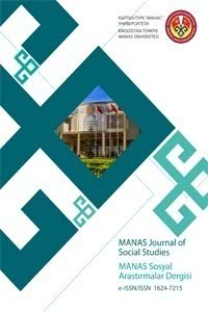Türk Eğitim Sisteminde Dijitalleşmeye Yönelik Uygulamalar
Eğitimde dijitalleşme, Dijital yeterlilikler, Harmanlanmış eğitim sistemleri
Applications of Digitalization in the Turkish Education System
___
- Avrupa Parlamentosu ve AB Konseyi (2006). Recommendation of the European Parliament and of the Council of 18 December 2006 on key competences for lifelong learning. Official Journal of the European Union, L394, 10- 18.
- Dört Beceride Türkçe Dil Sınavı: Pilot Çalışma Sonuçları. Erişim adresi: https://www.meb.gov.tr/meb_iys_dosyalar /2020_01/20094146_Dort_Beceride_Turkce_Dil_Sinavi_Ocak_2020.pdf.
- European Commission/EACEA/Eurydice (2019). Digital Education at School in Europe. Eurydice Report. Luxembourg: Publications Office of the European Union.
- European Commission/EACEA/Eurydice, 2019. Digital Education at School in Europe.
- Eurydice Report. Luxembourg: Publications Office of the European Union.
- Ferrari, A., Punie, Y. ve Redecker, C. (2012). Understanding digital competence in the 21st century: An analysis of current frameworks. In A. Ravenscroft, S. Lindstaedt, C. Delgado Kloos, & D. Hernández-Leo (Eds.), Proceedings 7th European Conference on Technology Enhanced Learning, ECTEL2012 (79–92). New York: Springer.
- Fukuyama, F. (2018). Kimlik: Çağdaş kimlik siyaseti ve tanınma mücadelesi. İstanbul: Profil Kitapları.
- Granrath, L. (2017). Japan’s society 5.0: Going beyond ındustry 4.0. Erişim adresi: https://www.japanindustrynews. com/2017/08/ japans-society-5-0-going-beyond-industry-4-0/.
- Heyman, F., Norbäck, P. J. ve Persson, L. (2021). Digitalisation, Productivity and Jobs: A European Perspective. The European Union and the Technology Shift, 135-159.
- MEB (2006). Millî Eğitim Bakanlığı Öğretmen Yetiştirme ve Eğitimi Genel Müdürlüğü. Öğretmenlik Mesleği Genel Yeterlikleri. Ankara: MEB Yayını.
- MEB (2008). Millî Eğitim Bakanlığı Öğretmen Yeterlikleri. Öğretmenlik Mesleği Genel ve Özel Alan Yeterlikleri. Ankara: Devlet Kitapları Müdürlüğü.
- MEB (2018). 2023 Eğitim Vizyonu. Erişim adresi: http://2023vizyonu.meb.gov.tr/doc2023_EGITIM_VIZYONU.
- MEB (2023). Fatih Projesi. Erişim adresi: http://fatihprojesi.meb.gov.tr/about.html.
- OECD (2015). Student Computers and Learning: Making the Connection Implication of Digital Technology for Education Policy and Practice.
- Prensky, M. (2001). Digital natives, digital immigrants part 2: Do they really think differently? On the horizon.
- Recro Digital Marketing (2021). Dijital 2021 raporunda Türkiye ve dünyada internet ve sosyal medya kullanımı karşılaştırması. Erişim adresi: https://recrodigital.com/dijital-2021-raporunda-turkiye-ve-dunyada-internet- ve-sosyal-medya-kullanimi-karsilastirmasi-ocak-2021/.
- Schwab, K. (2016). The fourth industrial revolution. Cologny: World Economic Forum
- Tasarım Beceri Atölyeleri. Erişim adresi: http://tba.meb.gov.tr/index.html.
- Tømte, C. E., Fossland, T., Aamodt, P. O. ve Degn, L. (2019). Digitalisation in higher education: mapping institutional approaches for teaching and learning. Quality in Higher Education.
- TÜBİSAD (2021). Türkiye’nin Dijital Dönüşüm Endeksi 2021. Erişim adresi: https://www.tubisad.org.tr/tr/images /pdf/tubisad-2021-dde-raporu.pdf.
- WEF. (2019). Platform for shaping the future of the new economy and society. Schools of the future: Defining new models of education for the fourth industrial revolution. Erişim adresi: http://www3.weforum.org/docs/WEF _Schools _of _ the _Future_Report_2019.pdf
- ISSN: 1694-7215
- Yayın Aralığı: Yılda 4 Sayı
- Başlangıç: 2001
- Yayıncı: Kırgızistan Türkiye Manas Üniversitesi
Amartya Sen’in Yetenek Yoksunluğu Olarak Yoksulluk Analizi
Orta Gelirli Ülkelerin Covid Süreci Sağlık Göstergeleri Açısından Etkinlik Analizi
Elif ACAR, Durmuş GÖKKAYA, Osman ŞENOL
İş Güvencesizliğinin İşten Ayrılma Niyetine Etkisi: Kendine Güvenin Ilımlaştırıcı Rolü
Liselerde Gerçekleştirilen Rekreatif Sosyal Etkinlikler: Bir Meta-Sentez Çalışması
Vildan EKİCİ UYSAL, Yusuf SÖZER
Türk Sigortacılığının Yüz Yılı: Makro Çevresel Faktörler Üzerine Kapsamlı Bir Analiz
Cumhuriyet Tarihimizde Sağlık Sisteminin Gelişimi ve Organizasyonel Dönüşüm
Gülay KARABOĞA, Yakup ÇAĞLAR, İrge ŞENER
Siber Stalklama Ölçeği’nin Türk Kültürüne Uyarlanması: Geçerlik ve Güvenirlik Çalışması
Lokman KOÇAK, Mustafa ÖZGÖL, Mustafa DEMİR
Bugünün Çocuğu Yarının Yetişkini için Anne ve Babaların Etkili Ebeveyn Rollerinin Geliştirilmesi
Sema AYDIN-CERAN, Ebru ERGÜL, Mustafa YAVUZ
Halide Edip Adıvar’ın Vurun Kahpeye Adlı Romanında Cumhuriyetçi Açılımlar
Türk Sinemasında Potlaç Kültürüne Alternatif Olarak Nietzscheci Armağan Modeli: Kosmos Filmi
